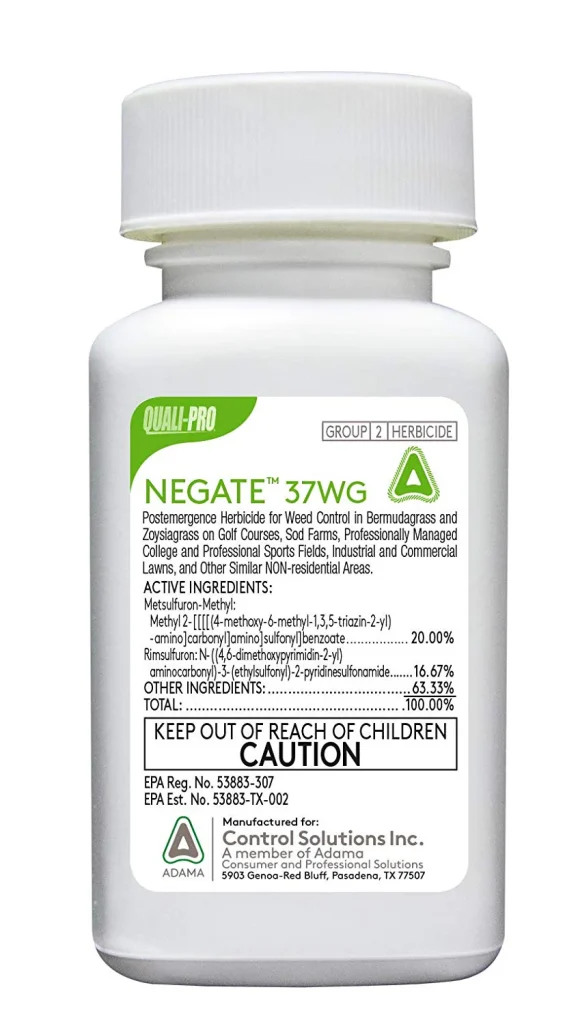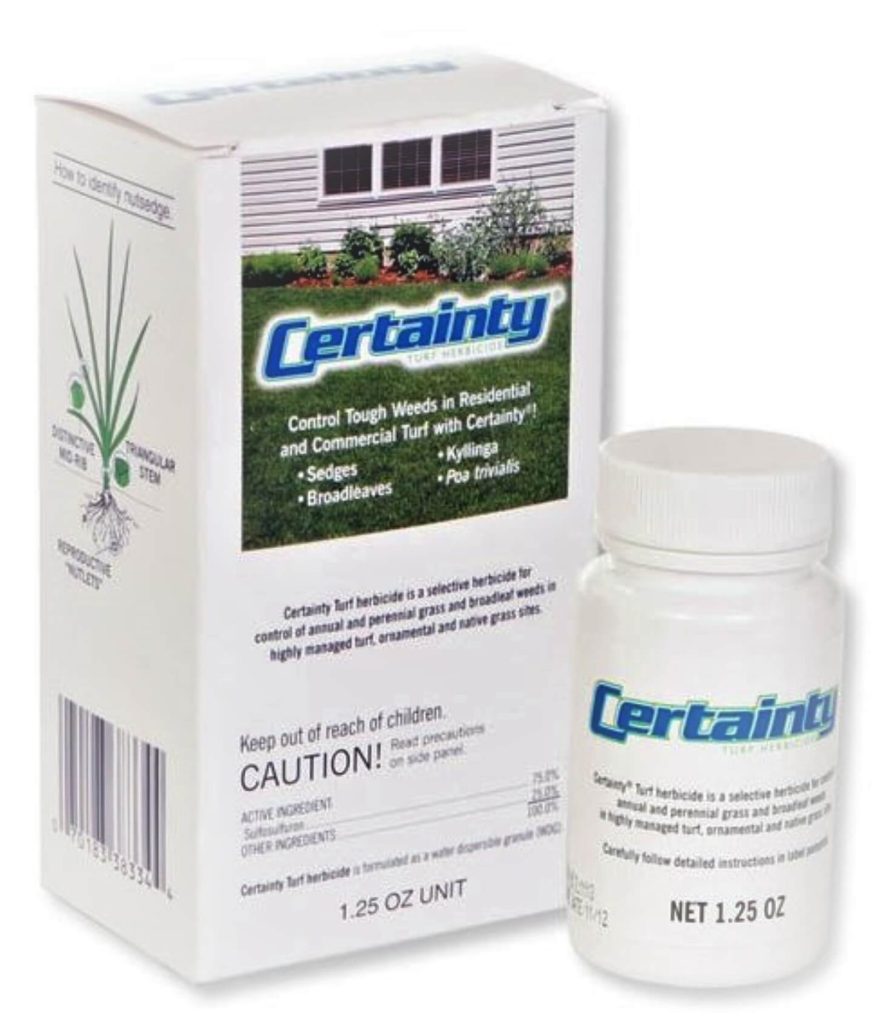While pre-emergent herbicides are excellent for preventing weeds from taking root in your Bermuda grass lawn, what do you do when weeds have already sprouted? That’s where post-emergent herbicides come into play. These products are designed to tackle weeds that have already germinated and are visible in your lawn, without hurting any of your Bermuda grass. In this guide, we’ll explore the most effective post-emergent options for Bermuda grass.
The Best Form of Weed Control
Before we begin, understand: “The best form of weed control is a healthy, dense, actively growing lawn.” – Texas A&M
It’s a chicken or the egg causality dilemma.
Two Products Kill 99.9% of Weeds
At a high level, if you combine Celsius and Certainty, you can kill 99.9% of weeds in Bermuda grass without harming the grass. Celsius kills nearly all broadleaf weeks and Certainty kills all grassy weeks. Although it may look expensive because of how concentrated it is, we actually did the math and it’s very comparable to other options, but more effective.
What Are Post-Emergents?
Post-emergent herbicides target weeds that have already germinated and are visible above the soil. They are designed to kill or control these weeds, either by affecting their growth or directly causing them to die. We will only look at selective herbicides meaning they don’t kill all plant life, just weeds that aren’t Bermuda grass.
Identify The Weed
Before we get into the list, it’s best you download the Google Lens app and take some photos of your weeds. This will tell you what kind of weed you’re dealing with. It’s not always accurate but it’s accurate enough to work with. Once you have a list of weeds you’re trying to target, you can analyze the labels for each of the products below to see if it is designed to kill that weed. For example, Certainty is fantastic at killing grassy weeds but if you try to kill broadleaf weeds, your results will be less than optimal.

Top Post-Emergents for Bermuda Grass
Celsius

Strengths: Highly effective against a broad range of weeds and has no temperature restrictions. When combined with Certainty, this will kill 99.9% of weeds in bermudagrass. It will also harm your grass less than big box store brand herbicides like Image.
Weaknesses: Slow to show signs of damage to the weeds; may take up to 2-3 weeks to see complete die-off.
Order Celsius from Amazon or Ebay (Ebay is usually cheapest and ships anywhere)
| Labeled Use Rates | oz/1,000 sq ft | grams/1,000 sq ft | oz/A | grams/A |
|---|---|---|---|---|
| Low | 0.057 | 1.6 | 2.5 | 70 |
| Middle | 0.085 | 2.4 | 3.7 | 105 |
| High | 0.113 | 3.2 | 4.9 | 140 |
Certainty

Strengths: Also effective against a wide variety of weeds and has no temperature restrictions. When combined with Celsius, this will kill 99.9% of weeds in bermudagrass. Certainty kills poa annua and nutsedge effortlessly.
Weaknesses: Similar to Celsius, it takes time to show visible results.
Order Certainty from Amazon or the generic
Negate 37WG | Certainty | |
| Kills Poa Annua | ✅ | ✅ |
| Kills Nutsedge | ❌ | ✅ |
| Easy To Mix | ❌ | ✅ |
| Shelf life | 30 Days* | 10 Years |
| Cost | $55 | $125 |
| Must Mix Full Bottle | ✅ | ❌ |
| Coverage | 43,560 sq. ft | 35,000 sq. ft |
| Ideal For | Large properties seeking cost-effective coverage per acre | Suburban lawns needing broad weed control and cost-effective coverage per year |
* The entire bottle must be mixed at once to achieve the correct concentration. The mixed solution is only effective for 30 days.
| Desired Application Rate (ounces of product/acre) | Number of Scoops (including scoop size) | Mix Volume (gallons of water) | Spray Rate (gallons/1000 ft²) |
|---|---|---|---|
| 0.25 | 1 small scoop | 2.0 | 2 |
| 0.50 | 2 small scoops | 2.0 | 2 |
| 0.75 | 3 small scoops | 2.0 | 2 |
| 1.0 | 1 large scoop | 2.5 | 2 |
| 1.25 | 1 large scoop | 2.0 | 2 |
| 2.0 | 2 large scoops | 2.5 | 2 |
Tribute Total
Strengths: Known for its exceptional control of broadleaf weeds, Tribute Total is the superior option. It is probably the most comprehensive post-emergent you can buy for Bermuda grass and it kills the toughest weeds. If Celsius and Certainty kill 99.9% of weeds, then Tribute Total must kill 99.99% of weeds (not an actual stat).
Weaknesses: Usage is restricted by temperature, typically between 85-90°F, potentially limiting its application during Bermuda grass’s peak growing period. Additionally, it may temporarily hinder Bermuda grass growth for a brief period of 1-2 weeks. The upfront cost is quite large but users can purchase fractions of a bottle on local forums.
Revolver (Foramsulfuron)
Strengths: Revered for its efficacy in targeting broadleaf weeds, Revolver offers an economical solution, often found in diluted forms at prominent retail chains. Great for killing ryegrass and other residential grasses.
Weaknesses: Usage is constrained by temperature, generally between 85-90°F, potentially restricting its application during Bermuda grass’s key growth season. Moreover, it might temporarily impede Bermuda grass growth for a short span of 1-2 weeks.
2,4-D (eg. SpeedZone)
2,4-D is one of the cheapst herbicides you’ll find for weeds in your Bermuda grass lawn. If you’re on a budget, it’s a great option for killing broadleaf weeds if your expectations are not high.
Strengths: Great for broadleaf weed control and is relatively inexpensive as it’s available in diluted quantities at big box stores.
Weaknesses: Has temperature restrictions, usually between 85-90°F, which can be limiting during Bermuda’s prime growing season. It can slow the growth of Bermuda grass for 1-2 weeks.
Order SpeedZone which contains 2,4-D here
Quinclorac (eg. Drive XLR8)
Quinclorac is an excellent selective herbicide to remove weeds from Bermuda grass lawns. It is specifically known for killing crab grass. Quinclorac is more effective on grassy weeds than Celsius and it is more effective on crabgrass than Certainty.
Strengths: Excellent for killing crabgrass and St Augustine.
Weaknesses: While effective, Celsius may be a better option for hotter temperatures.
Dicamba (eg. Fahrenheit)
Strengths: Controls a wide range of broadleaf weeds; effective in combination with other herbicides.
Weaknesses: Risk of vapor drift and damage to non-target plants; environmental concerns particularly in waterways.
Order Fahrenheit from Ebay (same price and great if Amazon is sold out or won’t ship to your state)
Metsulfuron Methyl (MSM Turf)
Strengths: Effective on tough broadleaf and some grassy weeds; low application rate required.
Weaknesses: Slow action; care needed to avoid harm to nearby desirable plants.
Sulfentrazone (Dismiss)
Strengths: Effective on nutsedge and other resistant weeds; provides fast results.
Weaknesses: Higher cost compared to other herbicides; may not be effective on all broadleaf weed species.
Rimsulfuron (Negate 37WG)
Strengths: Highly effective on a wide range of grassy and broadleaf weeds; useful for controlling perennial ryegrass in Bermuda grass. It has a selective action that allows it to be used in established turf without harming Bermuda grass.
Weaknesses: Delayed action, as results may take several days to appear; generally higher cost compared to more common herbicides like 2,4-D. Limited effectiveness on some broadleaf weed species; potential for resistance development if overused.
Triclopyr (Bonide Vine & Stump Killer)
Strengths: Triclopyr excels in controlling woody and broadleaf weeds, including challenging vine species like poison ivy. Its systemic action ensures thorough kill from foliage to root, appropriate for selective use in Bermuda grass.
Weaknesses: Potential for temporary Bermuda grass discoloration and suppression if misapplied. Its efficacy against grassy weeds is limited, and its environmental impact, especially near aquatic environments, requires cautious use.
How To Apply
First gather what you need beyond your herbicide which is a sprayer, surfactant (or dish soap) and maybe blue dye. Sprayer size depends on the size of your lawn and how many weeds you have. For small lawns, spot spraying can be done with a 1 gallo pump sprayer. However for broadcast applications (only recommended for serious infestations as it stunts grass growth), you will want to use a battery powered backpack sprayer for consistent coverage. The pressure on pump sprayers changes.
Fill your sprayer with water. How much water you need depends on your situation. Let’s say we had an infestation on 4000 sqft, and we think 10-20% of the lawn is weeds. It’s not quite enough to broadcast, so we’ll just do spot spraying. Fill the jug with 1 gallon of water and we’ll follow the label instructions for how much herbicides. We’ll add some blue dye to see where we’ve sprayed, making application easier. We’ll also add an optional dash of white vinegar or citric acid to lower the pH of our water to make the herbicide more effective.
Here’s an example for Celsius with Certainty:
| Water | Surfactant | Blue Dye | Acidifier | Celsius | Certainty |
| 1 gallon | 1/3 fl oz (2 teaspoons) | Eyeball a teaspoon or two | Couple tablespoons | 0.085 oz (2.4 grams) | 0.3 grams (2 small scoops) |
Application Tips
- Temperature: Always check the temperature restrictions on the label, especially for products like 2,4-D.
- Timing: For slow-acting herbicides like Celsius and Certainty, apply well before you need the lawn to be weed-free, as they can take weeks to show full results. It appears to be a coincidence that the herbicides that act slowest are also the herbicides that cause the least stress to Bermuda grass.
- Safety: Always follow the safety guidelines on the label, including wearing protective gear when applying the herbicide.
When to Consider a Restart
If your lawn is so overrun with weeds that it requires a strong herbicide like MSMA (cancerous and not labeled for residential use), it might be worth considering a complete lawn restart. In such cases, you can use a non-selective herbicide like glyphosate to kill off all vegetation and begin anew with a healthy bermudagrass lawn.
Non-selective Herbicides
If you need to kill everything, including the grass, you should use a non-selective herbicide. Avoid Round Up, for a few reasons.
- Round Up formula changes from state to state
- Round Up has different versions and the wrong version can taint the soil
- Round Up costs 2 or 3 times as much
41% Glyphosate
This is perhaps the most well-known and widely used non-selective herbicide globally. It’s effective against a broad spectrum of grasses, broadleaf weeds, and woody plants. Don’t buy Round Up as it’s expensive and it sometimes includes additives that do other things to your soil. Glyphosate is simple, well-studied and cheap.
Glyphosate + Imazapyr (RM43)
Strengths: RM43 offers robust broad-spectrum control, effectively targeting a wide range of weeds including grasses, broadleaf weeds, and brush. The combination of glyphosate and imazapyr ensures both immediate and prolonged action, preventing regrowth for up to a year. This makes RM43 ideal for managing areas where no vegetation is desired long-term and not ideal for places like lawns where regrowth is desired. Use with caution.
Conclusion
Post-emergent herbicides are an essential tool for maintaining a beautiful Bermuda grass lawn, especially when weeds have already made an appearance. Whether you choose Celsius, Certainty, 2,4-D, Quinclorac, or even consider the drastic step of using MSMA, understanding the strengths and weaknesses of each option will help you make an informed decision. Armed with this knowledge, you’re well on your way to reclaiming your lawn from the clutches of invasive weeds.
Leave a Reply